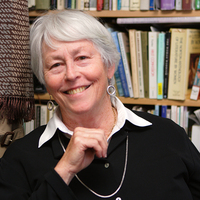- Emeritus professor of English and Environmental Studies, with research on landscape imagery in literature, animal stu... moreEmeritus professor of English and Environmental Studies, with research on landscape imagery in literature, animal studies, phenomenology, and Deep History. Interested in the developing area of inter/trans/disciplinary Environmental Humanities. 1998 President of the Association for the Study of Literature and Environment, author of several monographs, editor of The Cambridge Companion to Literature and the Environment (2014), co-editor of A Global History of Literature and the Environment (2017).edit
Research Interests:
Research Interests:
Research Interests:
Research Interests:
Research Interests:
Research Interests:
'Universe'; a part limited in time and space. He experiences himself, his thoughts and feelings as something separated from the rest? a kind of optical delusion of his consciousness. This delu sion is a kind of prison for us,... more
'Universe'; a part limited in time and space. He experiences himself, his thoughts and feelings as something separated from the rest? a kind of optical delusion of his consciousness. This delu sion is a kind of prison for us, restricting us to our personal ...
Research Interests:
A number of converging imperatives have prompted widespread professional at-tention to environmental readings in the humanities recently, generating ideas that can only promise increasingly focused development in the future. One gen-eral... more
A number of converging imperatives have prompted widespread professional at-tention to environmental readings in the humanities recently, generating ideas that can only promise increasingly focused development in the future. One gen-eral response to greater awareness of environmental ...
Research Interests:
Research Interests:
Research Interests:
... Research in Phenomenology 31 (2001), 173186; Glen A. Mazis, Earthbodies, Rediscovering Our Planetary Senses (Albany, NY: State University of New York Press, 2002); John Russon,Embodiment and Responsibility: Merleau-Ponty and the... more
... Research in Phenomenology 31 (2001), 173186; Glen A. Mazis, Earthbodies, Rediscovering Our Planetary Senses (Albany, NY: State University of New York Press, 2002); John Russon,Embodiment and Responsibility: Merleau-Ponty and the Ontology of Nature, Man and ...
Research Interests:
... They lost two horses and a buggy, and most of Page 27. 5 Early Days in Clio and Birmingham their possessions. But they did not give up, because they felt they were included in God's plan. Then Papa got a church in Clio, where... more
... They lost two horses and a buggy, and most of Page 27. 5 Early Days in Clio and Birmingham their possessions. But they did not give up, because they felt they were included in God's plan. Then Papa got a church in Clio, where I was born in 1909. I was named Sarah Lucille for ...
Research Interests:
Weyerhaeuser Environmental Classics Weyerhaeuser Environmental Classics are reprinted editions of key works that explore human relationships with natural environments in all their variety and complexity. Drawn from many different... more
Weyerhaeuser Environmental Classics Weyerhaeuser Environmental Classics are reprinted editions of key works that explore human relationships with natural environments in all their variety and complexity. Drawn from many different disci-plines, they examine how natural ...
Research Interests:
Research Interests:
Research Interests:
This essay demonstrates how, fifty years ago, Maurice Merleau-Ponty had moved far beyond Heidegger to accomplish the kind of profound reconsideration of human relations with other animals that Derrida urged in his late writings but could... more
This essay demonstrates how, fifty years ago, Maurice Merleau-Ponty had moved far beyond Heidegger to accomplish the kind of profound reconsideration of human relations with other animals that Derrida urged in his late writings but could not himself pursue.
